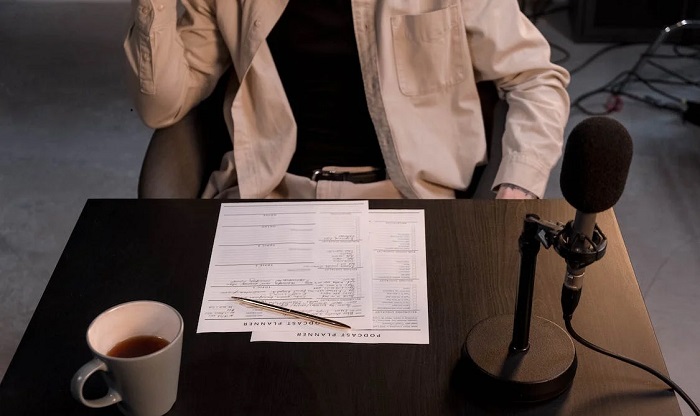How to write a podcast script: 10 tips
Just like having good podcast cameras, creating a script is something that will really help in increasing the quality of the content. Just as you can’t travel by car to an unknown place without GPS, you can’t create a podcast without a well-written script. After all, having an idea of what you want for your podcast, but not knowing how to get there, can cause you problems. For this reason, as important as AI tools for podcasting, scripts exist to professionalize your content.
Writing a script for a podcast is not the same as writing a script for a film, for example. As this is generally a live broadcast, there are certain specific items that cannot be missing from this type of text. In the end, what really matters is that it offers a general idea of what your recording or broadcast will be like.
A well-written script helps give your program structure and direction. Certainly, with it, you will feel more comfortable eliminating that nervous feeling that may appear when recording, and it also is a great way to eliminate errors. Therefore, in this article, we will help you with 10 tips on how to create a podcast script.
And if you don’t have your own podcast yet, also read these 10 steps to start your podcast from scratch.
Are podcasts usually scripted?
It’s natural for podcasts to have some type of script, which can be brief topics that will direct the show or a script with every detail of the episode planned out. There is no right or wrong way to script your show. If you’re skilled at improvising and like exploring different paths, you can stick to simple notes. However, if you often feel pressure in front of podcast microphones and are afraid of simply blanking out on everything you were going to say, it may be more appropriate to define the details by producing a script. Now, let’s go to the 10 tips.

10 things that cannot be missing from a podcast script
Creating interesting and authentic content for your podcast is essential for it to stand out from the competition and gain a large audience. One of the keys to making each episode very well done is creating a script. Recognizing its importance, we will now detail the ten essential things that cannot be missing from a well-designed script for a podcast.
See also: What to have in a podcast setup?
1. Introduction for the hosts
The first tip on how to create a podcast script is to create a good introduction for the hosts. To do this, the first step you must take is to mention the host’s name and surname. After that, quickly write how each host will present, highlighting their areas and interests. Here, include everything relevant that should be said to help your audience get to know the program’s presenters better.
Something that can add even more value is mentioning the presenter’s background or relevant experience. For example, you can invite a host to help you interview a sports medicine professional, like Dr. Mike. If the host of the program has already participated in bodybuilding competitions and won some, knowing that the interviewer also understands the area can bring a lot of value to your audience.
Don’t forget to include the presenters’ contact information and social networks in the script. This helps the audience learn more about who is hosting the podcast. However, when putting together this introduction, do not set a too rigid tone. If you do this, it may result in your listeners not being as close to the host. Therefore, unless your show is very formal, write a friendly and natural introduction.
2. Advertising from sponsors
Now it’s time to assemble the sponsor’s message into the podcast script. You can include in the script the message that the sponsor themself sent, with everything they expect to be said about their brand. Another option would be to write the most important topics in the script and let the presenters improvise when speaking.
If you simply mention that the program is being sponsored by a t-shirt company, for example, this advertisement may not be as successful. However, if you script the various benefits of these t-shirts, the public may feel more confident about purchasing them.
Therefore, include in your script some tips on how to talk about the brand as if you had a positive personal experience with it. If you have a discount coupon or promotional code, don’t forget to include this in the script as well. But don’t ignore the warnings about the product. For example, if the show is sponsored by a gambling company, include text in the script about needing to be of legal age to access it, so the presenters don’t forget to mention it.
When writing about the sponsor in the video description, count on the help of these 12 best AI copywriting tools.

3. Calls to Action
Calls to action, or simply CTAs, are crucial in the process of creating a podcast script. After all, through them, you can enable listeners to easily take various actions, such as sharing the podcast episode with a friend, visiting your crowdfunding page for the show, or even clicking on a sponsor’s link.
There are various types of CTAs, and you need to know which one is best to include in the program script. The first type is the primary CTA. It should be straightforward and easy to accomplish, such as encouraging your audience to share your show or give it a like.
The other form of CTA is the secondary one. Reserve it for responses to surveys, fundraising for a charitable organization, or purchasing your sponsor’s product. Since it will require viewers to put in a bit more effort, make sure to craft how these CTAs will be phrased in the script.
Another type of CTA is the bonus CTA. It is used when there’s an additional element to share, such as special content available exclusively through a crowdfunding campaign or accessing a specific website through a link in the program’s show notes and making a corresponding payment.
4. Summary of the episode theme
To create a summary of the episode theme for your podcast, you need to be clear and get straight to the point. Remember that the goal here is to grab your audience’s attention, so avoid excessive information and complicated details at this stage. One tip for being more concise is to highlight the main topic of the episode. This way, right from the beginning, viewers will know what the episode’s theme is.
During the summary, you can also explain why the theme is important. To make the theme truly relevant, consider discussing current issues or common problems of your target audience. Next, you can create a trigger to mention the presence of guests. Although it’s not the time for a full introduction, it’s important to provide a brief summary to connect your audience with the people who will be participating in the program.
When crafting sentences for the episode theme summary, choose words that spark curiosity. Avoid technical terms to keep the presentation light. A final tip for this phase is that, during the preparation, you can already provide hints to the hosts about the podcast’s tone. If the program has a humorous tone, include a touch of humor in your presentation of the episode’s subject.
Also, explore these 12 artificial intelligence tools for SEO.
5. Guest introduction
The next tip on how to create a podcast script is the guest introduction. You mustn’t overlook this step because the guest needs to receive an appropriate and accurate introduction. Furthermore, your audience should know who the guest is. For example, if you invite a nutritionist to talk about the benefits of fruits for human health, it’s essential to write a detailed bio about this guest in the script. This way, the audience will know that they have the authority to speak on the episode’s topic.
When writing information about the guest, be careful not to include incorrect details. Additionally, don’t forget to include any contextual information that helps the audience understand the importance of the guest’s presence on the podcast.
To encourage your listeners to continue listening to what your guest has to say, don’t just list their LinkedIn profile. Include something in the script that makes people feel closer to the guest. For example, you can mention that they are there to answer questions, share their story, and provide insights on a specific subject.
6. Key Topics to Be Covered
To ensure that the theme of an episode is thoroughly addressed without straying too far off-topic, it’s very helpful to identify key topics that should be used to smoothly guide the program. By pre-organizing the most important topics in the script, the episode’s content will be richer and more likely to pique the audience’s interest, keeping them engaged until the end.
For example, if your guest is a nutritionist, you can cover key topics such as “intermittent fasting,” “fruits that lead to weight gain,” and “weight loss.” If your guest of the day is a comedian, consider topics like “live shows,” “censorship,” and “impressions” as suggestions for the script. On the other hand, if your guest is an astronomer, you could include topics such as “black holes,” “habitable planets,” and “life on Mars.”
You can also use tools like Google Trends or social media platforms to gauge the popularity of potential topics. Then, prioritize these topics in a list from most important to least important in your script.

7. Questions to discuss with guests
Continuing with our tips on how to create a podcast script, let’s talk about the questions to discuss with a guest. To write these questions, you need to keep in mind what the listeners’ questions might be on the topic, what you want them to learn, and any interesting stories about the guest. It can be helpful at this stage to open a question box on Instagram, for example, so that people can submit their inquiries.
Don’t forget to use the key topics we mentioned in tip 6. Your questions should be based on them to give your program coherence. When structuring the questions to be asked to your guest, start with the simplest ones that pertain to the expert’s background. If there’s a question that has been asked by many people, or you know that a particular story from the guest will be the highlight of the interview, save it to be the final question in the script. This way, you can keep your audience engaged.
Questions about the guest’s personal story can add depth to the interview and help establish a stronger connection with the audience. Embrace these questions as well, but be careful not to overstep boundaries. Avoid asking intrusive questions that may embarrass the guest. If it fits the expert’s profile, ask questions that address different perspectives to promote more interesting discussions.
8. Wrapping up the podcast
Now it’s time to wrap up the podcast. In your script, include all the information on how the hosts should handle this conclusion. Start by writing a closing hook to be used if the hosts have difficulty wrapping up the conversation with the guest. It could be a catchy or interruptive phrase like “And so, we conclude today’s podcast” or something similar.
Specify in the script the amount of time the guest will have for their final remarks and the order in which this should occur if there are multiple guests. Then, outline in the script any topics or reminders that the hosts should cover when closing the program. Don’t forget to remind them in the script to bid farewell to the audience and promote monetization methods such as memberships or donations.
Depending on the marketing strategy set by the podcast owners, include information about the next episode and who the guest will be. Creating some intrigue by providing hints about the next guest without revealing their identity can make the audience curious and eager for the next episode.
9. Final mention of the sponsor
Continuing with the discussion on the conclusion, even though you’ve already mentioned the sponsor at the beginning of the podcast, when you reach the end, it’s essential to reinforce it, reminding the audience that the podcast is made possible thanks to the company that provides financial support. When adding this mention to your script, briefly repeat the key message or main points of the sponsor that you shared at the beginning of the episode. Express gratitude to the sponsor for supporting the podcast, further reinforcing the positive relationship between you.
Additionally, use a CTA to remind listeners to engage with your sponsor after the podcast ends. Encourage them to check out the sponsor’s social media, visit the website, and consider purchasing the products and services offered by the sponsor. However, construct the script for this ending with gentle language. Avoid making your audience feel that you are being overly promotional about your sponsors.
One tip to make this presentation more natural is to personalize the final sponsor mention according to the context of the episode. This way, you can ensure that the final sponsor mention is well integrated into the episode’s flow of ideas. You can also use this moment to emphasize any benefits that your sponsor has provided to your audience, such as a discount code or special promotion.
10. Credits for Artistic and Technical Production
We’ve reached the end of our guide on how to create a podcast script. Now, in your script, you should write a brief summary about the importance of the production team and remind the hosts to thank everyone who contributed to the episode. Do this before listing the names of the individuals who participated in creating the episode. Having the names of the technical team in the script helps the hosts remember everyone’s names.
When mentioning a name, also state the role played by that person in the production of the episode. Depending on each individual’s profile, you can share their social media handles so that people can learn more about their work. Additionally, if there have been significant contributions or support from individuals who are not part of the core production team, you can include a section for “Special Thanks.” This will also highlight their importance to your work.
However, remember that it’s important to keep this list as short as possible. If the number of people involved in the production is extensive, you might overwhelm your listeners. To address this, consider including the information in the podcast credits or the episode’s description field. Always put yourself in the audience’s shoes and assess how long they would be willing to listen to a list of names that may not hold much meaning for them.

How to Include Instructions for the technical team in the script
The structure of a podcast script goes beyond what is said during its broadcast. Therefore, the script needs to contain some technical details to guide the professionals. So, we’ll give you four more tips, focusing on the technical aspects of the program.
Introduction
If you consume podcasts, you’ve probably noticed that most of them feature a unique intro or soundtrack placed right at the beginning. These, along with other audio or visual interventions, should be described in the script, especially the moment they should be inserted during the recording.
Sponsorship
If your sponsor provides any audio or video material, it’s essential to write in the script when this content will be included in the episode. For example, if it’s after the guest’s introduction, signal in the script so that the hosts are aware of when these interventions will occur.
Participation
If the podcast is live, viewer questions may arise during the broadcast. Since the hosts are focusing on the guests, it’s natural that they may not be following the chat and social media. As such, a member of the technical team can help by reading aloud what the audience is saying or asking and highlighting the most relevant comments. Clearly indicate in the script when these interventions can take place.
Sound Effects
When structuring the podcast’s topics, indicate the moments when special elements will come into play. This could include background music, smooth transitions, or audio inserts. Additionally, provide guidance on the type of music or sound effect desired for each point.
What is a podcast script?
A podcast script is a kind of written guide for the hosts to know what to do at each moment during the recording or broadcasting of an episode. A script should include all the points that should not be forgotten, such as topics to be discussed, questions to be asked, and advertiser mentions.
How to create a podcast script?
To create a podcast script, start by identifying specific questions or topics that need to be discussed during the episode. Include sections for the introduction and conclusion, as well as any advertisements or sponsors that need to be mentioned.
What should be included in a podcast script?
A podcast script should include an introduction, the introduction of the hosts and guests, the main topics to be covered during the episode, questions to guide the discussion or interview, reminders to mention advertisers or relevant events, and finally, a conclusion.
What should not be missing in a podcast?
In a podcast, it’s essential to have clear audio and high-quality visuals if applicable. The content should be relevant and provide value to the target audience, whether in terms of information, entertainment, or both. It’s vital to interact and engage with the audience, encouraging feedback or participation.
What to cover in a podcast?
In a podcast, you can share personal stories or experiences, conduct interviews with experts or interesting personalities, discuss news or current events related to your podcast’s theme, answer audience questions, or have in-depth discussions on specific topics.





